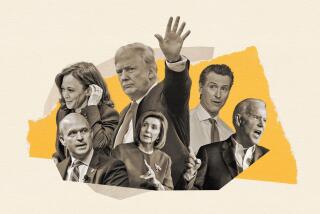California and the West : Davis Offers Tribes Increased Gaming : Compromise: To break impasse over Prop. 5, governor proposes to double number of slot machines permitted.
SACRAMENTO — Gov. Gray Davis is proposing a plan that could allow Indian tribes to more than double the number of slot machines they operate in California over the next five years, according to an administration document distributed to tribal leaders over the weekend.
Under the plan, tribes now operating about 15,000 slot machines--and non-gambling tribes that want to jump into the lucrative business--could add as many as 15,000 machines. The 37-page document, obtained Monday by The Times, is intended as a blueprint “to initiate a new era of tribal-state cooperation” and break the impasse over Proposition 5, the Indian gambling initiative overwhelmingly approved by voters last year but struck down last week by the state Supreme Court.
If the compact is signed and approved by the Legislature, and an accompanying constitutional amendment exempting Indian tribes from the state’s ban on Las Vegas-style gambling is then passed by voters, there would probably be vastly increased opportunities for legal gambling in California.
In the wake of the court action last week, Davis met with tribal leaders and said he would favor a “modest” expansion of Indian gambling as a way to head off a new initiative campaign. A second bargaining session is scheduled for today in Sacramento.
Critics of the closed-door talks say that the overall deal--including the proposed compact and the constitutional amendment--eventually would open the door to such games as roulette not now allowed in the state.
A spokesman for the Davis administration declined to comment on the proposal being circulated.
But one source familiar with the negotiations said “roulette and craps won’t happen” on Davis’ watch. The source cautioned that there are many elements in the proposal “that may never see the light of day.”
Under a 1988 federal law, Congress set up a framework for tribal-state regulation of gambling as a way to pump up the economy on Indian reservations.
Former Gov. Pete Wilson negotiated compacts with 11 Indian tribes. Republican Wilson sought to limit the number of slot machines to just under 20,000. Proposition 5 had no curbs on the number of slot machines. Davis’ proposal falls somewhere in between.
Davis would allow the tribes with the 15,000 existing machines to expand that number to nearly 20,000. Non-gambling tribes could operate as many as 350 machines each, going up to almost 500 machines after five years. If 20 non-gambling tribes sought machines, that could boost the numbers by another 10,000.
As proposed by Davis, in 2005 tribes could ask the state to reopen negotiations “concerning future growth in the number of tribal gaming terminals [slot machines].”
One sticking point remains as to whether the Indians will allow workers to be represented by labor unions. The proposal indicates that collective bargaining rights still need to be hammered out.
Tribal officials could not be reached for comment.
However, one tribal representative described the proposal as “insulting” because it falls far short of what voters approved in Proposition 5.
More to Read
Get the L.A. Times Politics newsletter
Deeply reported insights into legislation, politics and policy from Sacramento, Washington and beyond. In your inbox three times per week.
You may occasionally receive promotional content from the Los Angeles Times.










